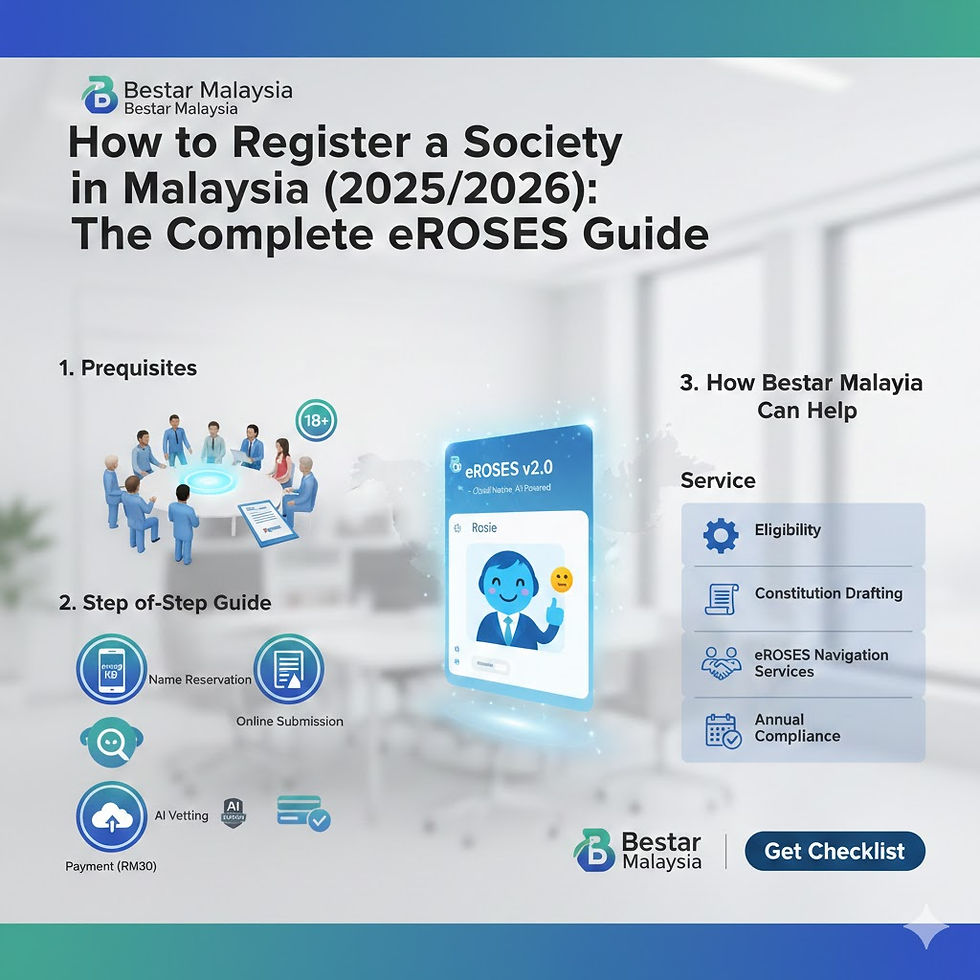How to Set Up a Trust Fund in Malaysia
- Roger Pay
- Jan 19, 2023
- 4 min read
Updated: Jan 20, 2023

Companies incorporated in Malaysia can be registered as trusts, subject to eligibility criteria and current laws. Trusts can be created for a variety of purposes, including investment, property or insurance.
In order to set up a trust in Malaysia, the founders must comply with the Trust Companies Act. The settlor is the person who creates the trust, he can be an individual or a company in Malaysia. The trustee is the appointed person who is responsible for administering the trust in the best interest of the beneficiaries. In some cases, the settlor may decide to appoint a protector or an enforcer to oversee the activities of the trustee. Beneficiaries are those who legally benefit from the trust. They can be individuals or companies. One of our accountants in Malaysia can help you set up a trust in Malaysia. You can also discuss all the details about immigration to Malaysia.
Opening a trust in Malaysia
Trusts in Malaysia are registered as public companies and registered with the Registrar of Companies. The Trust Companies Act sets out certain conditions for a company to qualify as a trust:
- it must serve one of the approved purposes (family, investment, insurance, charity, special, etc.);
- has a minimum authorized capital;
- part of the above capital contribution has been fully paid up in good faith;
- the company has a duly appointed board of directors and is able to meet its obligations.
As mentioned above, trusts can be set up for various purposes. Our accountants in Malaysia describe some of the common types of trusts that investors can set up:
- Discretionary Trust: This is a trust that gives the trustees a large degree of power and the ability to exercise their powers according to their own discretion; in these cases, the beneficiaries have no legal rights and the settlor is the one who provides direction to the trustee as needed or through a special document stating his intent for the management of the trust.
- Fixed Interest Trust: Unlike the previous case, the trustee does not have unlimited power over how assets are distributed to beneficiaries; in some cases, investors can set a combination of fixed interest and discretion to match the fund’s assets allocation.
- Maintenance Trust: This can also be called a accumulation trust, and is only partially discretionary; for example, discretion is allowed until the beneficiary (usually a child) reaches a certain age or completes school; from then on, the trust is fixed interest.
- Purpose Trust: This is a trust that has no beneficiaries but is used for charitable purposes.
- Reserved Powers Trust: As the name implies, in this case, the settlor can grant reserved or special powers to the trustee, such as investing of trust assets or appointing or removing beneficiaries.
When registering a company as a trust company in Malaysia, the applicant must provide several completed forms, the Articles of Association, details of the company’s directors and shareholders, and other documents. The trust deed is the main document related to the trust, which sets out the powers of the trustee, and the terms and conditions under which he can manage the trust assets. The document also includes a description of the assets legally owned by the trustee and identifies other details about the administration of the trust, the number of trustees and whether a protector or enforcer has also been appointed. An expert at our accounting firm in Malaysia can assist interested individuals in drafting this important document based on the type of trust they are establishing and the specifics they wish to include in the trust deed.
One of our accountants in Malaysia can assist you in filing your application with the Registrar. If the documents are complete, the Registrar will request further statements from the directors of the company. Additional application conditions may exist and it is advisable to seek professional help before taking these steps. We also invite you to have a discussion with our tax accountants in Malaysia if you are interested in this topic. We can help you with tax formalities in Malaysia.
Trust administration and taxation in Malaysia
Trusts in Malaysia are subject to taxation on income sourced in the country. The tax year is the same as for an LLC. For tax purposes, the trust is treated as a separate entity. Its income is assessed separately from the personal income tax charged to the beneficiaries of the trust. The standard corporate income tax rate for Malaysian trusts is 24%, whether or not it is a non-resident trust. For non-resident trusts, withholding tax applies to trust income. We stress the fact that this only applies in certain situations and for certain types of income the provisions of double taxation treaties signed by Malaysia may be relevant.
For tax purposes, a trust is considered resident (for a given tax year) if its trustee members are residents for the same tax year. In other cases, a trust is not considered a resident of Malaysia if:
- when the trust is established abroad by a non-resident;
- when the trust's income for a given tax year is wholly foreign-sourced;
- when the trust is managed outside Malaysia throughout the tax year;
- when at least half of the trustees are not residents of Malaysia in a given tax year.
Personal income tax applies to the income received by the beneficiary, at a progressive rate of up to 30% for resident individuals and at a rate of 30% for non-resident individuals. One of our tax accountants in Malaysia can provide you with complete details on the total taxable income of the trust beneficiaries.
Other types of taxes that may be applicable to Malaysian trusts include stamp duty and real estate gains tax. Stamp duty is exempted when assets are transferred to certain trust instruments such as transfer deed instruments and real estate transfer instruments approved by the Securities Commission. The real estate gains tax exemption applies to the disposition of chargeable assets to a REIT or property trust fund.
Investment trusts and property trusts in Malaysia are suitable for investors who want to diversify their investment portfolio and protect their assets. Individuals interested in the well-being of their families in Malaysia can also choose to ensure the financial well-being of their children, for example, by setting up a special children's trust, which costs less than a property trust.
One of our accountants in Malaysia can provide you with complete information on opening a trust company. You can also consult our tax accountants in Malaysia for tax advice and related aspects.
Contact us for more details and professional tax advice on the Trust Companies Act.



Comments